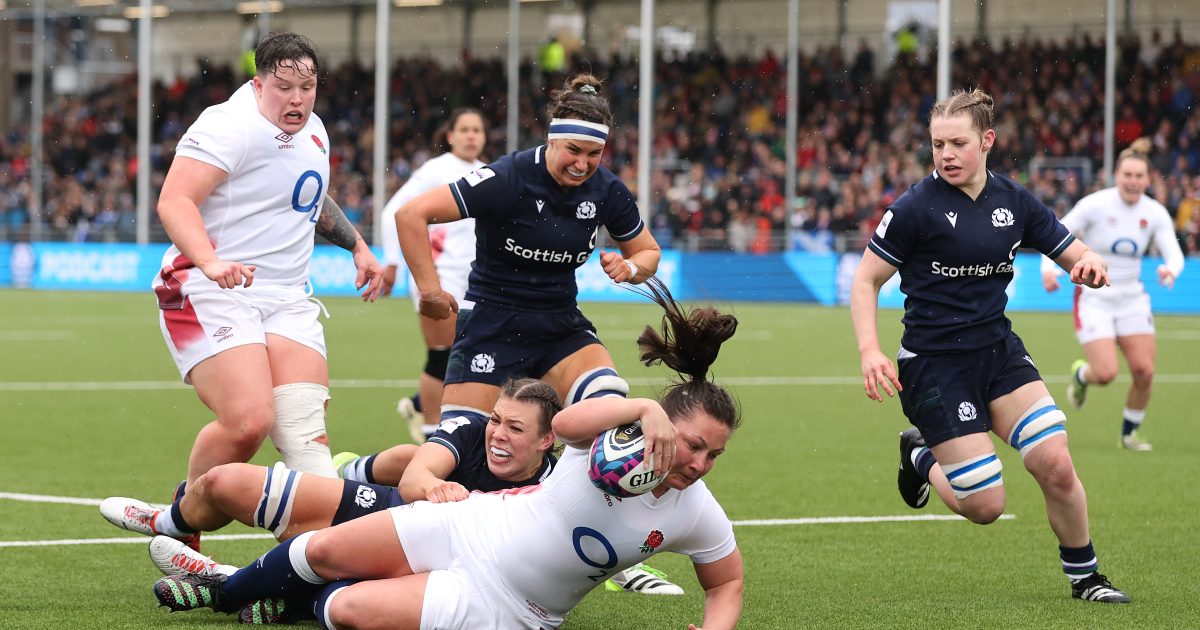Les Anglaises fidèles à elles-mêmes

Huit essais contre l’Italie lors de la première journée, huit essais face au pays de Galles à l’issue du deuxième match, huit essais ce samedi contre l’Écosse. L’Angleterre, grande favorite à sa propre succession dans le Tournoi des Six Nations, fait preuve d’une grande régularité jusqu’à maintenant dans ses performances.
Pour le meilleur comme pour le pire. Car les Red Roses, tellement dominatrices collectivement, sont aussi terriblement indisciplinées individuellement. Amy Cokayne, qui faisait son retour en équipe nationale, a ainsi écopé de deux cartons jaunes (déblayage dangereux et plaquage à l’épuale), un par mi-temps, synonymes d’expulsion (52e).
En trois matchs, c’est le deuxième carton rouge adressé aux Anglaises : en Italie, lors de la première journée, c’est la N.8 Sarah Beckett qui avait reçu un rouge direct pour une prise crocodile dans un ruck, qui avait entraîné la blessure d’une joueuse Azzurra.
Les Anglaises sont tellement au-dessus du lot, dans ce Tournoi, que cet handicap ne semble pas vraiment en être un pour elles. A Parme, elles avaient été capables de marquer, même à 13 contre 15.
A Édimbourg, en infériorité numérique, les joueuses de John Mitchell ont continué à trouver des espaces, à créer des décalages, à tout simplement jouer comme si de rien n’était. Résultat, elles ont inscrit autant d’essais une fois Cokayne aux vestiaires qu’à 15 contre 15 !
La malheureuse Amy Cokayne est passée par toutes les émotions. Elle qui n’avait pas revêtu le maillot blanc depuis un an a rapidement fêté son retour par un essai (7e) derrière une touche à 5 m. Une joie ternie par son premier carton reçue à la demi-heure de jeu.
Cela n’empêchait pas les visiteuses d’atteindre sereinement la pause, déjà bien installée en tête (0-17, essais de Cokayne, Dow et Kildunne).
Trois matchs, trois doublés pour Kildunne
Si la pluie qui avait rincé les joueuses au moment des hymnes se calmait au retour des citrons, la tempête anglaise continuait de déferler sur les fragiles digues écossaises.
Dominatrices devant, les Anglaises s’appuyaient sur leur mêlée pour enfoncer le clou. Sadya Kabeya démarrait derrière son pack à 5 m de la ligne pour aller marquer sans véritable opposition (0-24, 44e). Puis, comme à l’entraînement, elles lançaient une action grand large derrière leur mêlée. Le décalage tout en vitesse était imparable, et Jess Breach marquait un très joli essai en première main (0-29, 52e).
L’ailière plantait un doublé sept minutes plus tard (0-34, 59e). Un essai qu’elle ne devait qu’à elle, en réceptionnant puis relançant un coup de pied de dégagement écossais dévissé.
En cinq minutes, on passait d’un doublé à un autre avec cette 2e réalisation de l’après-midi d’Ellie Kildunne (0-39, 65e). L’arrière, auteur de deux essais à chaque match du Tournoi jusqu’ici, est plus que jamais la meilleure marqueuse de la compétition.
Enfin, l’habituelle capitaine Marlie Packer, remplaçante ce samedi au Hive Stadium, célébrait son entrée par un nouvel essai (0-46, 73e) synonyme du tarif maison : 0-46.
Pour la troisième fois en trois matchs, l’Angleterre passe donc plus de 40 points à son adversaire. Pour la deuxième fois en trois matchs, elles n’ont pas encaissé le moindre point. Pour la deuxième fois en trois matchs, elles ont terminé à 14. Pas sûr que ce soit suffisant pour rassurer les deux derniers adversaires des Anglaises, l’Irlande et la France…








































